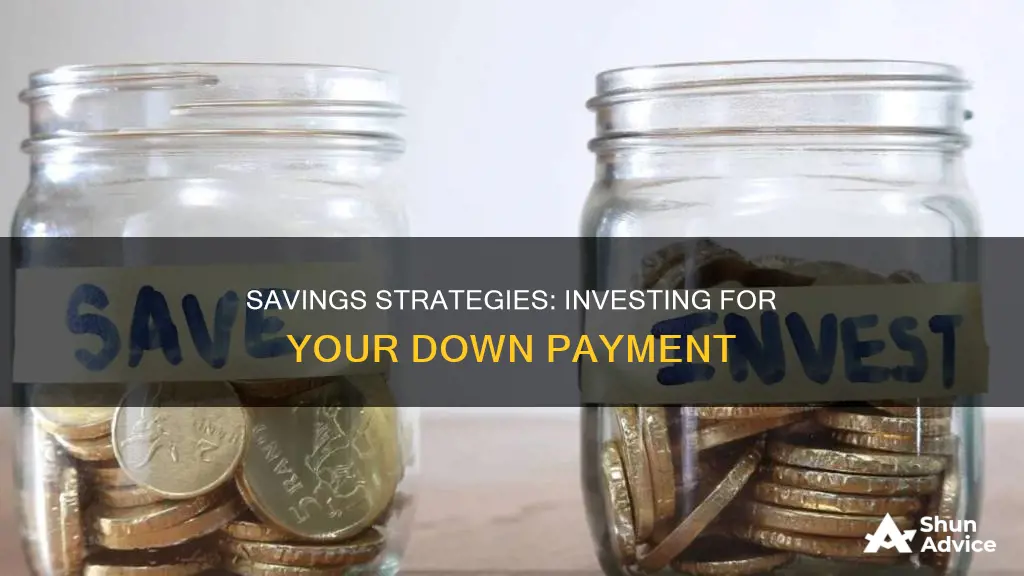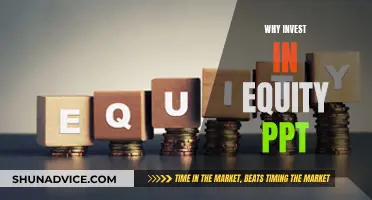
Saving for a down payment on a house can feel like a daunting task, but with the right strategies, it can be achievable. Here are some tips on where to invest your savings for a down payment:
- Set clear savings goals: Determine how much house you can afford and calculate the required down payment. The down payment is typically between 3% to 20% of the home's value, but it can vary depending on the loan type and your financial situation.
- Choose the right savings account: Put your money in a high-yield savings account, money market account, or certificate of deposit (CD). These options offer higher interest rates than traditional savings accounts and provide easy access to your funds.
- Automate your savings: Set up automatic transfers from your checking account to your savings account. You can also split your paycheck to have a portion directly deposited into your savings account.
- Explore additional income sources: Consider taking on a side hustle, freelancing, or turning a hobby into a source of income to boost your savings.
- Reduce expenses: Cut back on unnecessary expenses, negotiate lower rates on recurring bills, and focus on paying off any existing debt.
- Look for down payment assistance programs: Research local and state housing authority programs that offer down payment assistance, such as forgivable loans, grants, or matching funds.
- Reprioritize your savings goals: Consider reducing contributions to retirement accounts temporarily to boost your down payment savings. However, maintain your emergency fund and ensure it remains intact.
What You'll Learn

High-yield savings accounts
When choosing a high-yield savings account, look for one that is FDIC-insured and has no monthly maintenance fees or minimum deposit requirements. This will ensure that your money is protected and that you can access your funds without incurring additional costs.
In addition to high-yield savings accounts, there are a few other options for saving for a down payment. Money market accounts offer a slightly higher interest rate than savings accounts and also provide check-writing privileges, debit cards, and ATM access. Certificates of deposit (CDs) are another option, offering a fixed interest rate for a set period of time. However, be sure to consider the timeline for your purchase, as withdrawing your money early from a CD may result in a penalty.
Overall, high-yield savings accounts are a great option for those looking to boost their savings and easily access their funds while still enjoying the protection of FDIC insurance.
Saving vs. Investing: Ramsey's Key Differences Explained
You may want to see also

Money market accounts
When choosing a money market account, look for one with a competitive annual percentage yield (APY) and no monthly fees. Some accounts may also offer expanded FDIC insurance, providing an extra layer of protection for your savings. Here are some of the top money market accounts to consider:
- Vio Bank: Offers a competitive APY of 5.05% with a minimum opening deposit of $100 and no monthly maintenance fee.
- Quontic Bank: Features a competitive APY of 5.00% and a minimum opening deposit of $100. Includes a debit card and mobile deposit.
- Ally Bank: Provides a competitive APY of 4.00% with no minimum balance requirement or monthly service fee. Offers check-writing privileges, a debit card, and access to Allpoint's ATM network.
- Sallie Mae Bank: Delivers a competitive APY of 4.20% with no minimum opening deposit or monthly service fee. Includes check-writing privileges.
Remember to compare the features and requirements of each money market account before making a decision. Additionally, consider your timeline for buying a house. While money market accounts are suitable for short-term savings, investing in the stock market may be an option if you have a longer timeframe.
Savings Accounts: Invest or Save?
You may want to see also

Certificates of deposit
Where to Find Them
CDs are generally offered by banks and credit unions, and it's important to shop around for the best interest rates. Online banks tend to offer higher interest rates than traditional brick-and-mortar banks.
How They Work
When you open a CD, you agree to keep your money in the account for a specified period, known as the term or maturity date. During this time, you cannot withdraw the money without paying an early withdrawal penalty. The early withdrawal penalty varies depending on the bank and the length of the CD term.
Interest Rates
CDs typically offer higher interest rates than regular savings accounts, and the interest is compounded daily. This means that you earn interest not only on the initial amount deposited but also on the interest that accumulates over time. The longer the term of the CD, the higher the interest rate is likely to be.
Types of CDs
There are several types of CDs to choose from, including:
- Standard CDs: These are the most common type, offering a fixed interest rate for a specified term.
- Jumbo CDs: These require a minimum deposit, typically ranging from $100,000 to $1 million, and offer higher interest rates than standard CDs.
- Liquid CDs: These allow for more flexibility, as they do not have early withdrawal penalties. However, they may offer lower interest rates than standard CDs.
- Step-up or Step-down CDs: These have variable interest rates that can increase (step-up) or decrease (step-down) at specified intervals during the term.
- Callable CDs: These allow the bank to terminate the CD before the maturity date if interest rates drop. In this case, you will get your initial deposit back plus any interest earned up to that point.
- Bump-up CDs: These allow you to take advantage of rising interest rates by giving you the option to increase your interest rate during the term, usually once or twice.
- No-penalty CDs: These allow you to withdraw your money early without paying a penalty, but they may offer lower interest rates than standard CDs.
When to Consider CDs
CDs are a good option if you have a clear timeline for when you plan to buy a house. They are ideal for those who are within a few years of buying, as they offer a guaranteed return on your investment without the risk of losing money. If you are more than five years away from buying a house, you may consider investing your down payment in the stock market, as this could potentially provide higher returns. However, the stock market is more volatile, and you risk losing money if the market takes a downturn.
Tips for Using CDs to Save for a Down Payment
- Compare interest rates: Shop around for the best interest rates, as these can vary significantly between banks. Online banks tend to offer higher rates than traditional banks.
- Consider the term carefully: Choose a term that aligns with your timeline for buying a house. If you need to access your money earlier than the maturity date, you will likely incur an early withdrawal penalty.
- Be mindful of penalties: Understand the early withdrawal penalties before opening a CD. These penalties can eat into your returns if you need to access your money early.
- Ladder your CDs: If you are saving for a down payment that is a few years away, consider CD laddering. This involves opening multiple CDs with different maturity dates, allowing you to take advantage of changing interest rates and access your money in increments without incurring penalties.
- Automate your savings: Set up automatic transfers from your checking account to your CD to ensure that you save consistently towards your down payment goal.
- Don't touch your emergency fund: It can be tempting to use your emergency fund to boost your down payment savings, but it's important to keep this fund intact. Once you become a homeowner, you will need that cushion to cover unexpected expenses.
- Consider other savings options: In addition to CDs, you may want to diversify your savings by using other low-risk options, such as high-yield savings accounts or money market accounts.
Saving for a down payment on a house can be a challenging but rewarding endeavour. By using CDs effectively, you can grow your savings and get one step closer to achieving your dream of homeownership.
How to Allocate Your Money: Rent, Savings, Investments, and Utilities
You may want to see also

Automate your savings
Automating your savings is a great way to save for a down payment on a house without having to think about it. Here are some ways to do it:
Set up automatic transfers
Arrange for money to be automatically transferred from your checking account to your savings account for your down payment. You can choose how often you want to transfer money, whether that's monthly, weekly, or on a different schedule.
Direct deposit
If you receive your paycheck through direct deposit, you can ask your employer to split your paycheck and deposit a portion directly into your savings account. That way, you save a certain amount from every paycheck without having to transfer the money manually.
Stash your spare change
Some banks and budgeting apps offer a feature that rounds up your card purchases to the nearest dollar and puts the change into a linked savings account. This is an easy way to save small amounts of money that can add up over time.
Use a cash-back credit card
Using a cash-back credit card for your purchases can help you earn rewards that you can put toward your down payment fund. Just make sure to pay off the credit card balance each month to avoid paying interest, which could negate the benefits of the cash back.
Automating your savings is a useful strategy for reaching your financial goals. By setting up regular transfers and taking advantage of features like direct deposit and round-ups, you can save for a down payment without constantly having to think about it. This can help you stay motivated and on track with your savings plan.
Marie Curie's Family Savings: Lost Investment, Found Legacy
You may want to see also

Explore additional sources of income
If you have the time and energy, taking on a side hustle or an additional income source can help you save for your down payment faster. Here are some ideas to boost your income:
- Freelancing or consulting: Leverage your skills and expertise to take on freelance work or consulting projects.
- Side gigs: Consider driving for a ride-sharing company, delivering food, pet sitting, or babysitting.
- Turn your hobby into an income stream: Do you have a hobby that could bring in some extra cash? For example, you could sell crafts, teach music lessons, or offer photography services.
- Start a small business or side venture: If you have an entrepreneurial spirit, starting a small business can be a great way to generate additional income.
- Get a promotion or change jobs: If possible, aim for a promotion at your current job or look for a higher-paying position elsewhere.
- Sell items you no longer need: Go through your belongings and sell anything of value that you no longer use.
- Look for passive income opportunities: Invest in income-generating assets, such as dividend-paying stocks or real estate investment trusts (REITs).
Remember that any additional income you earn can be put directly into your savings to help you reach your down payment goal faster.
Why You're Not Saving and Investing: Excuses Debunked
You may want to see also
Frequently asked questions
It is recommended to put your money in a savings account where it can grow while still being protected through FDIC insurance. Examples include a high-yield savings or money market account.
The down payment is the upfront cash you pay to buy a house. Down payments generally range from 0% to upwards of 20% of the purchase price. The median down payment in 2022 was 14%.
This depends on how much money you're putting down and how much you can set aside. If you're planning to purchase a home within the next 3 years, it is recommended to hold down payment cash in checking, regular savings, or high-yield savings accounts. If you have a longer timeline, you could consider investing some of your home down payment funds, which could potentially provide higher returns.
There are several other costs to consider when buying a home, including closing costs, mortgage reserves, maintenance, moving expenses, and emergencies.







